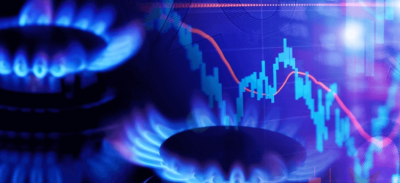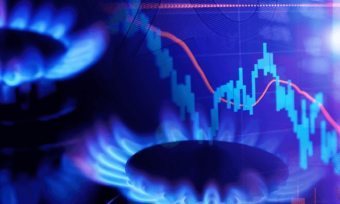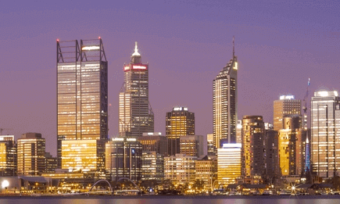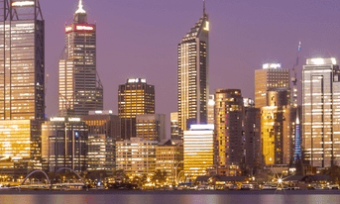What is the average gas bill?

KEY POINTS
- SA reported the highest average gas bills, followed by the ACT and VIC. Households in WA had the cheapest quarterly bills, with QLD second cheapest.
- From the age group of 40 to 49 years, there’s a trend of gas bills decreasing the older the customer is.
- Average gas bills increase as the number of residents does. The average gas bill for a 1-person household was found to be the cheapest at $149 a quarter.
In this Canstar Blue guide, we take a look at the average natural gas bills across Australia. We look at data based on state or territory, age group and household size to help you compare.
Even the tightest household budget is no match for an unexpected gas bill. Unfortunately, gas bills are just one more expense many Aussies don’t see coming, which can lead to bill-payers questioning the amount due. And while it may feel natural to query a bill, chances are it’s accurate.
In this guide, we look at the average gas bills across Australia so you can compare them against your costs. We’ll give you an elaborate breakdown from most states or territories, plus highlight average gas bills per household size and age group based on our research data. So, if your home just wouldn’t feel like a home without gas cooking or heating and you’re eager to see what your neighbours are paying, then look no further.
Average gas bill in Australia
A Canstar Blue survey conducted in December 2024 found the average quarterly gas bill in Australia to be $170. Across the country, 52% of survey respondents believed they get a good deal on gas, while only 18% of bill-payers have switched gas suppliers in the last two years. Despite this low number, 60% said it proved to be a good financial decision to switch.
The following table shows average quarterly gas bills across Australia, based on a Canstar Blue survey of more than 3,200 households. The costs reported include households of all sizes.
| State/territory | Average quarterly gas bill |
| Western Australia | $110 |
| Queensland | $170 |
| New South Wales | $176 |
| Australian Capital Territory | $185 |
| South Australia | $223 |
| Victoria | $180 |
Source: Canstar Blue research, December 2024. Northern Territory excluded due to insufficient data.
As you can see above, South Australia reported the highest average gas bills, followed by the Australian Capital Territory and Victoria. Households in Western Australia had the cheapest quarterly bills, with Queensland second cheapest. Keep reading for a thorough analysis of average gas bills across the capital cities in some of these states.
Average gas bill in Sydney
For households in New South Wales, Canstar Blue research found the average quarterly gas bill to be $176.
Below is a list of some of the cheapest natural gas plans available on the Jemena Gas Network for households in Sydney. Don’t miss out on a cheaper gas deal, compare now.
Compare gas plans in Sydney
Here are some of the cheapest gas deals on our database for NSW. These estimated annual costs are based on the Jemena Gas Network in Sydney and yearly gas usage of 18,800 MJ/year, but prices will vary depending on your own circumstances. The products are listed in order of lowest estimated price/year (including conditional discounts), then by the highest value rank (out of 10), then by highest brand satisfaction rating. These are products from referral partners†. Our database may not cover all deals in your area, and please check retailer websites for up to date information.
-
12 month energy plan with no exit fees Glossary
-
No lock in contract with variable rates Glossary
-
12 month energy plan with no exit fees Glossary
-
No lock in contract with variable rates Glossary
-
Ongoing energy plan with no renewal required Glossary
-
No lock in contract with variable rates Glossary
-
Ongoing energy plan with no renewal required Glossary
-
No lock in contract with variable rates Glossary
-
Ongoing energy plan with no renewal required Glossary
-
No lock in contract with variable rates Glossary
-
Ongoing energy plan with no renewal required Glossary
-
No lock in contract with variable rates Glossary
-
Ongoing energy plan with no renewal required Glossary
-
No lock in contract with variable rates Glossary
-
12 month energy plan with no exit fees Glossary
-
No lock in contract with variable rates Glossary
Advertiser Disclosure
Canstar Blue may earn a fee from its Online Partners for referrals from its website tables, and from sponsorship or promotion of certain products. Fees payable by product providers for referrals and sponsorship or promotion may vary between providers, website position, and revenue model. Sponsorship/promotion fees may be higher than referral fees. If a product is sponsored or promoted, it is an ad and it is clearly marked as such. An ad might appear in different places on our website, such as in comparison tables and articles. Ads may be displayed in a fixed position in a table, regardless of the product’s rating, price or other attributes. The location of an ad doesn’t indicate any ranking or rating by Canstar Blue. Payment of fees for ads does not influence Value Rank or Customer Satisfaction Ratings. See How We Get Paid to find out more.
General Disclosure – Energy
The data in the table is updated within 24 hours of Canstar Blue becoming aware of a change. You can find a description of the initial sort order below the table. You can use the sort buttons at the top of each column to re-order the display. Learn more about our Gas Value Rank Methodology.
Please note that the Satisfaction Rating displayed in the table is a rating relating to customers’ overall satisfaction with the brand. It should not be confused with an individual product rating. Learn more about Brand Satisfaction ratings and for more information on how the Brand Satisfaction ratings are calculated, read the Canstar Blue Most Satisfied Customers Methodology.
The results do not include all energy retailers or products in the market and may not compare all features relevant to you. Canstar Blue does not supply electricity or gas services. If you decide to apply for a particular energy product, you will deal directly with the retailer, not with Canstar Blue. Fees, charges, product information and contract terms should be confirmed directly with the relevant retailer.
Some plans may require you to meet certain conditions before a discount may become available to you. Check the energy provider’s plan information for details of all possible discounts that may apply and any conditions that need to be met for you to be eligible for these discounts.
Check your current plan’s exit fees and other termination provisions before changing providers.
Some plans may have a minimum term that is longer than one year. In that case the total cost over the term will be much higher than the estimated Price, which is for one year only. Consider the provider’s detailed product and pricing information before making a decision to take out a new plan or switch electricity providers.
Pricing Information
The price shown is inclusive of GST and is the estimated lowest possible price a representative customer would be charged in a year for each plan, assuming all conditions of discounts offered, if any, have been met. Gas usage assumptions have been derived from the average usages advertised by a selection of retailers in the distribution region as shown at the top of the table.
The general usage assumptions for products displayed in the table have been derived from:
- the average usages advertised by a selection of retailers in the distribution region as shown at the top of the table. The figures provided are intended to serve as general estimates and should be used for information only. If the amount of gas you actually use differs greatly from this estimate, your bill could be significantly larger or smaller than the estimated price/year listed for each plan; or
- if you have provided usage data from your gas bill, the estimated annual amount payable for this plan is based on your individual circumstances.
The estimated yearly Price is based on single rate tariffs, which is when a flat usage rate is charged for ‘blocks’ of gas consumed and could be a limited amount per day, month, quarter, which may include a second block with a different usage rate applied, or, season.
Some plans may have a minimum term longer than one year – in that case the total cost over the term will be much higher than the estimated yearly Price (which is only for one year).
Some plans may apply additional charges to the price shown. Always check the energy provider’s plan information for details of all charges that may apply.
What does the ‘phone’ mean?
By clicking on the number next to the phone icon, you will leave the Canstar Blue website and be connected with the call centre of the Online Partner’s brand that you have selected. You will be subject to that referral partner’s brand privacy policy and terms of use. You agree that Canstar Blue Referral Terms apply to this referral.
Average gas bill in Melbourne
In Victoria, the average household quarterly gas bill was $180.
Below is a list of some of the cheapest natural gas plans available on the Australian Gas Network for households in Melbourne. Compare your current gas plan with the cheapest on the market.
Compare gas plans in Melbourne
Here are some of the cheapest gas deals on our database for VIC. These estimated annual costs are based on the AGN – VIC network in Melbourne and yearly gas usage of 40,500 MJ/year, but prices will vary depending on your own circumstances. The products are listed in order of lowest estimated price/year (including conditional discounts), then by the highest value rank (out of 10), then by highest brand satisfaction rating. These are products from referral partners†. Our database may not cover all deals in your area, and please check retailer websites for up to date information.
-
Ongoing energy plan with no renewal required Glossary
-
No lock in contract with variable rates Glossary
-
Ongoing energy plan with no renewal required Glossary
-
No lock in contract with variable rates Glossary
-
12 month energy plan with no exit fees Glossary
-
No lock in contract with variable rates Glossary
-
Ongoing energy plan with no renewal required Glossary
-
No lock in contract with variable rates Glossary
-
Ongoing energy plan with no renewal required Glossary
-
No lock in contract with variable rates Glossary
-
0 month contract with no exit fees Glossary
-
Ongoing energy plan with no renewal required Glossary
-
No lock in contract with variable rates Glossary
-
Ongoing energy plan with no renewal required Glossary
-
No lock in contract with variable rates Glossary
Advertiser Disclosure
Canstar Blue may earn a fee from its Online Partners for referrals from its website tables, and from sponsorship or promotion of certain products. Fees payable by product providers for referrals and sponsorship or promotion may vary between providers, website position, and revenue model. Sponsorship/promotion fees may be higher than referral fees. If a product is sponsored or promoted, it is an ad and it is clearly marked as such. An ad might appear in different places on our website, such as in comparison tables and articles. Ads may be displayed in a fixed position in a table, regardless of the product’s rating, price or other attributes. The location of an ad doesn’t indicate any ranking or rating by Canstar Blue. Payment of fees for ads does not influence Value Rank or Customer Satisfaction Ratings. See How We Get Paid to find out more.
General Disclosure – Energy
The data in the table is updated within 24 hours of Canstar Blue becoming aware of a change. You can find a description of the initial sort order below the table. You can use the sort buttons at the top of each column to re-order the display. Learn more about our Gas Value Rank Methodology.
Please note that the Satisfaction Rating displayed in the table is a rating relating to customers’ overall satisfaction with the brand. It should not be confused with an individual product rating. Learn more about Brand Satisfaction ratings and for more information on how the Brand Satisfaction ratings are calculated, read the Canstar Blue Most Satisfied Customers Methodology.
The results do not include all energy retailers or products in the market and may not compare all features relevant to you. Canstar Blue does not supply electricity or gas services. If you decide to apply for a particular energy product, you will deal directly with the retailer, not with Canstar Blue. Fees, charges, product information and contract terms should be confirmed directly with the relevant retailer.
Some plans may require you to meet certain conditions before a discount may become available to you. Check the energy provider’s plan information for details of all possible discounts that may apply and any conditions that need to be met for you to be eligible for these discounts.
Check your current plan’s exit fees and other termination provisions before changing providers.
Some plans may have a minimum term that is longer than one year. In that case the total cost over the term will be much higher than the estimated Price, which is for one year only. Consider the provider’s detailed product and pricing information before making a decision to take out a new plan or switch electricity providers.
Pricing Information
The price shown is inclusive of GST and is the estimated lowest possible price a representative customer would be charged in a year for each plan, assuming all conditions of discounts offered, if any, have been met. Gas usage assumptions have been derived from the average usages advertised by a selection of retailers in the distribution region as shown at the top of the table.
The general usage assumptions for products displayed in the table have been derived from:
- the average usages advertised by a selection of retailers in the distribution region as shown at the top of the table. The figures provided are intended to serve as general estimates and should be used for information only. If the amount of gas you actually use differs greatly from this estimate, your bill could be significantly larger or smaller than the estimated price/year listed for each plan; or
- if you have provided usage data from your gas bill, the estimated annual amount payable for this plan is based on your individual circumstances.
The estimated yearly Price is based on single rate tariffs, which is when a flat usage rate is charged for ‘blocks’ of gas consumed and could be a limited amount per day, month, quarter, which may include a second block with a different usage rate applied, or, season.
Some plans may have a minimum term longer than one year – in that case the total cost over the term will be much higher than the estimated yearly Price (which is only for one year).
Some plans may apply additional charges to the price shown. Always check the energy provider’s plan information for details of all charges that may apply.
What does the ‘phone’ mean?
By clicking on the number next to the phone icon, you will leave the Canstar Blue website and be connected with the call centre of the Online Partner’s brand that you have selected. You will be subject to that referral partner’s brand privacy policy and terms of use. You agree that Canstar Blue Referral Terms apply to this referral.
Average gas bill in Brisbane
The average quarterly household gas bill in Queensland was $170. To see what prices are like in the market at the moment, below is a list of some of the cheapest natural gas plans available on the Australian Gas Network in Brisbane.
Compare gas plans in Brisbane
Here are some of the cheapest gas deals on our database for QLD. These estimated annual costs are based on the AGN – QLD in Brisbane and yearly gas usage of 8,300 MJ/year, but prices will vary depending on your own circumstances. The products are listed in order of lowest estimated price/year (including conditional discounts), then by the highest value rank (out of 10), then by highest brand satisfaction rating. These are products from referral partners†. Our database may not cover all deals in your area, and please check retailer websites for up to date information.
-
12 month energy plan with no exit fees Glossary
-
No lock in contract with variable rates Glossary
-
Ongoing energy plan with no renewal required Glossary
-
No lock in contract with variable rates Glossary
-
Ongoing energy plan with no renewal required Glossary
-
No lock in contract with variable rates Glossary
-
Ongoing energy plan with no renewal required Glossary
-
No lock in contract with variable rates Glossary
-
12 month energy plan with no exit fees Glossary
-
No lock in contract with variable rates Glossary
-
12 month energy plan with no exit fees Glossary
-
No lock in contract with variable rates Glossary
-
Ongoing energy plan with no renewal required Glossary
-
No lock in contract with variable rates Glossary
-
Ongoing energy plan with no renewal required Glossary
-
No lock in contract with variable rates Glossary
Advertiser Disclosure
Canstar Blue may earn a fee from its Online Partners for referrals from its website tables, and from sponsorship or promotion of certain products. Fees payable by product providers for referrals and sponsorship or promotion may vary between providers, website position, and revenue model. Sponsorship/promotion fees may be higher than referral fees. If a product is sponsored or promoted, it is an ad and it is clearly marked as such. An ad might appear in different places on our website, such as in comparison tables and articles. Ads may be displayed in a fixed position in a table, regardless of the product’s rating, price or other attributes. The location of an ad doesn’t indicate any ranking or rating by Canstar Blue. Payment of fees for ads does not influence Value Rank or Customer Satisfaction Ratings. See How We Get Paid to find out more.
General Disclosure – Energy
The data in the table is updated within 24 hours of Canstar Blue becoming aware of a change. You can find a description of the initial sort order below the table. You can use the sort buttons at the top of each column to re-order the display. Learn more about our Gas Value Rank Methodology.
Please note that the Satisfaction Rating displayed in the table is a rating relating to customers’ overall satisfaction with the brand. It should not be confused with an individual product rating. Learn more about Brand Satisfaction ratings and for more information on how the Brand Satisfaction ratings are calculated, read the Canstar Blue Most Satisfied Customers Methodology.
The results do not include all energy retailers or products in the market and may not compare all features relevant to you. Canstar Blue does not supply electricity or gas services. If you decide to apply for a particular energy product, you will deal directly with the retailer, not with Canstar Blue. Fees, charges, product information and contract terms should be confirmed directly with the relevant retailer.
Some plans may require you to meet certain conditions before a discount may become available to you. Check the energy provider’s plan information for details of all possible discounts that may apply and any conditions that need to be met for you to be eligible for these discounts.
Check your current plan’s exit fees and other termination provisions before changing providers.
Some plans may have a minimum term that is longer than one year. In that case the total cost over the term will be much higher than the estimated Price, which is for one year only. Consider the provider’s detailed product and pricing information before making a decision to take out a new plan or switch electricity providers.
Pricing Information
The price shown is inclusive of GST and is the estimated lowest possible price a representative customer would be charged in a year for each plan, assuming all conditions of discounts offered, if any, have been met. Gas usage assumptions have been derived from the average usages advertised by a selection of retailers in the distribution region as shown at the top of the table.
The general usage assumptions for products displayed in the table have been derived from:
- the average usages advertised by a selection of retailers in the distribution region as shown at the top of the table. The figures provided are intended to serve as general estimates and should be used for information only. If the amount of gas you actually use differs greatly from this estimate, your bill could be significantly larger or smaller than the estimated price/year listed for each plan; or
- if you have provided usage data from your gas bill, the estimated annual amount payable for this plan is based on your individual circumstances.
The estimated yearly Price is based on single rate tariffs, which is when a flat usage rate is charged for ‘blocks’ of gas consumed and could be a limited amount per day, month, quarter, which may include a second block with a different usage rate applied, or, season.
Some plans may have a minimum term longer than one year – in that case the total cost over the term will be much higher than the estimated yearly Price (which is only for one year).
Some plans may apply additional charges to the price shown. Always check the energy provider’s plan information for details of all charges that may apply.
What does the ‘phone’ mean?
By clicking on the number next to the phone icon, you will leave the Canstar Blue website and be connected with the call centre of the Online Partner’s brand that you have selected. You will be subject to that referral partner’s brand privacy policy and terms of use. You agree that Canstar Blue Referral Terms apply to this referral.
Average gas bill in Adelaide
The average quarterly household gas bill in South Australia was $223. If you think you could be paying too much for gas, compare your current plan with some of the cheapest natural gas plans on the Australian Gas Network in Adelaide below.
Compare gas plans in Adelaide
Here are some of the cheapest gas deals on our database for SA. These estimated annual costs are based on the AGN – SA network in Adelaide and yearly gas usage of 14,800 MJ/year, but prices will vary depending on your own circumstances. The products are listed in order of lowest estimated price/year (including conditional discounts), then by the highest value rank (out of 10), then by highest brand satisfaction rating. These are products from referral partners†. Our database may not cover all deals in your area, and please check retailer websites for up to date information.
-
Ongoing energy plan with no renewal required Glossary
-
No lock in contract with variable rates Glossary
-
Ongoing energy plan with no renewal required Glossary
-
No lock in contract with variable rates Glossary
-
Ongoing energy plan with no renewal required Glossary
-
No lock in contract with variable rates Glossary
-
Ongoing energy plan with no renewal required Glossary
-
No lock in contract with variable rates Glossary
-
Ongoing energy plan with no renewal required Glossary
-
No lock in contract with variable rates Glossary
-
Ongoing energy plan with no renewal required Glossary
-
No lock in contract with variable rates Glossary
-
12 month energy plan with no exit fees Glossary
-
No lock in contract with variable rates Glossary
-
12 month energy plan with no exit fees Glossary
-
No lock in contract with variable rates Glossary
Advertiser Disclosure
Canstar Blue may earn a fee from its Online Partners for referrals from its website tables, and from sponsorship or promotion of certain products. Fees payable by product providers for referrals and sponsorship or promotion may vary between providers, website position, and revenue model. Sponsorship/promotion fees may be higher than referral fees. If a product is sponsored or promoted, it is an ad and it is clearly marked as such. An ad might appear in different places on our website, such as in comparison tables and articles. Ads may be displayed in a fixed position in a table, regardless of the product’s rating, price or other attributes. The location of an ad doesn’t indicate any ranking or rating by Canstar Blue. Payment of fees for ads does not influence Value Rank or Customer Satisfaction Ratings. See How We Get Paid to find out more.
General Disclosure – Energy
The data in the table is updated within 24 hours of Canstar Blue becoming aware of a change. You can find a description of the initial sort order below the table. You can use the sort buttons at the top of each column to re-order the display. Learn more about our Gas Value Rank Methodology.
Please note that the Satisfaction Rating displayed in the table is a rating relating to customers’ overall satisfaction with the brand. It should not be confused with an individual product rating. Learn more about Brand Satisfaction ratings and for more information on how the Brand Satisfaction ratings are calculated, read the Canstar Blue Most Satisfied Customers Methodology.
The results do not include all energy retailers or products in the market and may not compare all features relevant to you. Canstar Blue does not supply electricity or gas services. If you decide to apply for a particular energy product, you will deal directly with the retailer, not with Canstar Blue. Fees, charges, product information and contract terms should be confirmed directly with the relevant retailer.
Some plans may require you to meet certain conditions before a discount may become available to you. Check the energy provider’s plan information for details of all possible discounts that may apply and any conditions that need to be met for you to be eligible for these discounts.
Check your current plan’s exit fees and other termination provisions before changing providers.
Some plans may have a minimum term that is longer than one year. In that case the total cost over the term will be much higher than the estimated Price, which is for one year only. Consider the provider’s detailed product and pricing information before making a decision to take out a new plan or switch electricity providers.
Pricing Information
The price shown is inclusive of GST and is the estimated lowest possible price a representative customer would be charged in a year for each plan, assuming all conditions of discounts offered, if any, have been met. Gas usage assumptions have been derived from the average usages advertised by a selection of retailers in the distribution region as shown at the top of the table.
The general usage assumptions for products displayed in the table have been derived from:
- the average usages advertised by a selection of retailers in the distribution region as shown at the top of the table. The figures provided are intended to serve as general estimates and should be used for information only. If the amount of gas you actually use differs greatly from this estimate, your bill could be significantly larger or smaller than the estimated price/year listed for each plan; or
- if you have provided usage data from your gas bill, the estimated annual amount payable for this plan is based on your individual circumstances.
The estimated yearly Price is based on single rate tariffs, which is when a flat usage rate is charged for ‘blocks’ of gas consumed and could be a limited amount per day, month, quarter, which may include a second block with a different usage rate applied, or, season.
Some plans may have a minimum term longer than one year – in that case the total cost over the term will be much higher than the estimated yearly Price (which is only for one year).
Some plans may apply additional charges to the price shown. Always check the energy provider’s plan information for details of all charges that may apply.
What does the ‘phone’ mean?
By clicking on the number next to the phone icon, you will leave the Canstar Blue website and be connected with the call centre of the Online Partner’s brand that you have selected. You will be subject to that referral partner’s brand privacy policy and terms of use. You agree that Canstar Blue Referral Terms apply to this referral.
Average gas bill in Perth
Bill-payers in Western Australia pay an average of $110 on natural gas per quarter, which is the lowest across the nation. That being said, if you are a Perth household that uses gas and you can’t remember the last time you compared plans, you could be missing out on savings. Below are some of the cheapest natural gas plans available on the ATCO Network in Perth.
Compare gas plans in Perth
Here are some of the cheapest gas deals on our database for WA. These estimated annual costs are based on the ATCO network in Perth and yearly gas usage of 6,300 units/year, but prices will vary depending on your own circumstances. The products are listed in order of lowest estimated price/year (including conditional discounts), then by the highest value rank (out of 10), then by highest brand satisfaction rating. These are products from referral partners†. Our database may not cover all deals in your area, and please check retailer websites for up to date information.
-
Conditional discounts: 35% off the usage charge with direct debit & e-billing Glossary
-
12 month energy plan with no exit fees Glossary
-
No lock in contract with variable rates Glossary
-
12 month energy plan with no exit fees Glossary
-
No lock in contract with variable rates Glossary
-
12 month energy plan with no exit fees Glossary
-
No lock in contract with variable rates Glossary
-
12 month energy plan with no exit fees Glossary
-
No lock in contract with variable rates Glossary
-
12 month energy plan with no exit fees Glossary
-
No lock in contract with variable rates Glossary
-
Conditional discounts: 35% off the usage charge with direct debit & e-billing Glossary
-
12 month energy plan with no exit fees Glossary
-
No lock in contract with variable rates Glossary
-
Conditional discounts: 25% off the usage charge with direct debit & e-billing Glossary
-
Ongoing energy plan with no renewal required Glossary
-
No lock in contract with variable rates Glossary
-
Conditional discounts: 12.50% off the usage charge when paid on time Glossary
-
Ongoing energy plan with no renewal required Glossary
-
No lock in contract with variable rates Glossary
Advertiser Disclosure
Canstar Blue may earn a fee from its Online Partners for referrals from its website tables, and from sponsorship or promotion of certain products. Fees payable by product providers for referrals and sponsorship or promotion may vary between providers, website position, and revenue model. Sponsorship/promotion fees may be higher than referral fees. If a product is sponsored or promoted, it is an ad and it is clearly marked as such. An ad might appear in different places on our website, such as in comparison tables and articles. Ads may be displayed in a fixed position in a table, regardless of the product’s rating, price or other attributes. The location of an ad doesn’t indicate any ranking or rating by Canstar Blue. Payment of fees for ads does not influence Value Rank or Customer Satisfaction Ratings. See How We Get Paid to find out more.
General Disclosure – Energy
The data in the table is updated within 24 hours of Canstar Blue becoming aware of a change. You can find a description of the initial sort order below the table. You can use the sort buttons at the top of each column to re-order the display. Learn more about our Gas Value Rank Methodology.
Please note that the Satisfaction Rating displayed in the table is a rating relating to customers’ overall satisfaction with the brand. It should not be confused with an individual product rating. Learn more about Brand Satisfaction ratings and for more information on how the Brand Satisfaction ratings are calculated, read the Canstar Blue Most Satisfied Customers Methodology.
The results do not include all energy retailers or products in the market and may not compare all features relevant to you. Canstar Blue does not supply electricity or gas services. If you decide to apply for a particular energy product, you will deal directly with the retailer, not with Canstar Blue. Fees, charges, product information and contract terms should be confirmed directly with the relevant retailer.
Some plans may require you to meet certain conditions before a discount may become available to you. Check the energy provider’s plan information for details of all possible discounts that may apply and any conditions that need to be met for you to be eligible for these discounts.
Check your current plan’s exit fees and other termination provisions before changing providers.
Some plans may have a minimum term that is longer than one year. In that case the total cost over the term will be much higher than the estimated Price, which is for one year only. Consider the provider’s detailed product and pricing information before making a decision to take out a new plan or switch electricity providers.
Pricing Information
The price shown is inclusive of GST and is the estimated lowest possible price a representative customer would be charged in a year for each plan, assuming all conditions of discounts offered, if any, have been met. Gas usage assumptions have been derived from the average usages advertised by a selection of retailers in the distribution region as shown at the top of the table.
The general usage assumptions for products displayed in the table have been derived from:
- the average usages advertised by a selection of retailers in the distribution region as shown at the top of the table. The figures provided are intended to serve as general estimates and should be used for information only. If the amount of gas you actually use differs greatly from this estimate, your bill could be significantly larger or smaller than the estimated price/year listed for each plan; or
- if you have provided usage data from your gas bill, the estimated annual amount payable for this plan is based on your individual circumstances.
The estimated yearly Price is based on single rate tariffs, which is when a flat usage rate is charged for ‘blocks’ of gas consumed and could be a limited amount per day, month, quarter, which may include a second block with a different usage rate applied, or, season.
Some plans may have a minimum term longer than one year – in that case the total cost over the term will be much higher than the estimated yearly Price (which is only for one year).
Some plans may apply additional charges to the price shown. Always check the energy provider’s plan information for details of all charges that may apply.
What does the ‘phone’ mean?
By clicking on the number next to the phone icon, you will leave the Canstar Blue website and be connected with the call centre of the Online Partner’s brand that you have selected. You will be subject to that referral partner’s brand privacy policy and terms of use. You agree that Canstar Blue Referral Terms apply to this referral.
Average gas bill based on household size
As the above-average gas costs from our research are based on households of all shapes and sizes, let’s dive further into the data to see how these utility bills look based on household size. The following table shows the average gas bill by household size across Australia.
| Household size | Average quarterly gas bill |
| 1 person | $149 |
| 2 people | $188 |
| 3 people | $220 |
| 4 people | $251 |
| 5 or more people | $262 |
Source: Canstar Blue research, December 2024.
This table follows an intuitive path, with average gas bills increasing as the number of residents does. The average gas bill for a 1-person household was found to be the cheapest at $149 a quarter. The average gas bill for a 2-person household crept down to $188 per quarter, while 3-person and 4-person households recorded an average of $220 and $251 for quarterly bills respectively. The average gas bill for a 5-person household or more was recorded at $262 a quarter.
Average gas bill based on age group
You’ve now seen the average costs by state, capital city and household size – but how does your age impact the amount you’ll be charged for gas in Australia? We’ve collated our data to show the average gas bills by age group at a national level.
| Age group | Average quarterly gas bill |
| 18 to 29 years | $204 |
| 30 to 39 years | $214 |
| 40 to 49 years | $221 |
| 50 to 59 years | $218 |
| 60 to 69 years | $195 |
| 70 years and over | $157 |
Source: Canstar Blue research, December 2024.
From the age group 40 to 49 years, there’s a trend of gas bills decreasing the older the customer is. This may be the result of customers being eligible for certain energy rebates or concessions, or gas consumption habits differing between age groups.
What impacts average gas bills?
Natural gas is fairly similar to electricity in that many factors contribute to your overall costs. Before choosing a gas plan, it’s important to think about which features are most important to you. Here’s what you should consider:
- Usage charges: some gas suppliers have set rates for all gas usage, while others charge gas usage in ‘blocks’, meaning prices will change depending on how much gas your household consumes.
- Supply charges: gas supply charges refer to the underlying costs of supplying gas to your home via the gas mains network. Supply charges are generally the fixed price component of a gas bill.
- Hidden fees: some gas suppliers may tuck fees away in the fine print, such as a connection fee, credit card surcharge, late payment fee, or a paper billing fee. This is why reading the details of your gas plan is important.
- Location: geography plays a major part in the price of natural gas. Customers should consider the difference in supply and running costs, especially if they live in a regional area or have lower gas usage needs.
- Incentives: whether it’s discounts or a rewards program, incentives are a great way for providers to compete for your business. It might even be a larger discount for bundling utilities with the same provider and capitalising on dual fuel providers.
You might also be interested in:
Can I get a better-than-average gas deal?
This will ultimately come down to your personal circumstances, but gas prices can change quite frequently, meaning there are always new deals available.
If you haven’t checked which plan you are on in the last 12 months, it will likely mean you’re not on the most competitive plan. To get a better-than-average gas deal, you’ll need to keep an eye on gas prices and be willing to switch if a better deal comes your way. You can learn more by clicking the link below.
Original reporting by Kelseigh Wrigley
Image Source: marketlan/Shutterstock
This article was reviewed by our Utilities Editor Tara Donnelly before it was updated, as part of our fact-checking process.

- Average gas bill in Australia
- Average gas bill in Sydney
- Average gas bill in Melbourne
- Average gas bill in Brisbane
- Average gas bill in Adelaide
- Average gas bill in Perth
- Average gas bill based on household size
- Average gas bill based on age group
- What impacts average gas bills?
- Can I get a better-than-average gas deal?














